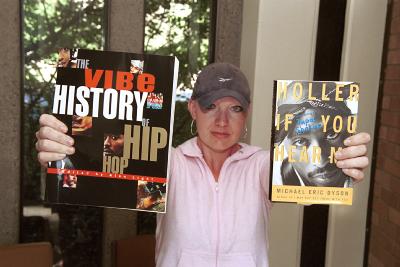August 7, 2003
Class uses hip-hop to look at classics
If students enrolled in Georgia Roberts’ fall quarter class expect two hours of celebrity worship every Friday afternoon, they’ve got another thing coming.
“The Textual Appeal of Tupac Shakur” will be a serious and challenging class, according to the graduate student in English. Students will read from a variety of difficult texts, including Sun Tzu’s The Art of War, Machiavelli’s The Prince, and Frantz Fanon’s Wretched of the Earth. And they’ll get there from lyrics penned by the late hip-hop artist Tupac Shakur.
“It’s about focal point,” Roberts said. “If you appeal to students from things that they want to talk about you can sort of expand out. It’s not even fooling them. It’s just being able to have a dialogue with students through something they’re already talking about and interested in.”
And so is Roberts. A Tupac fan since age 16, she says she read Machiavelli and other lofty texts because of her affinity for the enigmatic artist. She’s hoping to make similar connections for the 20 or so students signed up for the course offered as a “focus group” by the Program in the Comparative History of Ideas, where Roberts works as a graduate teaching assistant.
Consider Christopher Marlowe’s classic play The Tragical History of Dr. Faustus. The main character, in his quest for knowledge, sells his soul to the devil. That theme, Roberts says, is apparent in many of Tupac’s lyrics.
His work also makes reference to Machiavelli. Tupac, who reportedly studied the works of the Renaissance philosopher while serving a jail sentence, produced an album that was released after his violent death under the alias Makaveli. Music fans have suggested the album is an indication that Tupac faked his own death and will resurrect himself after a period of time. Roberts expects the course will enlighten some of those fans.
“I don’t have all the answers, but my hope is that when we read The Prince students will say, ‘Oh, this isn’t just about Tupac faking his own death. This is about some deeper things about what it means to be in power and how people can maneuver and manipulate power to their own ends.’ ”
The strategy is a good one, according to John Toews, chair of the CHID program.
“What she wants to do is take students’ connection to this hip-hop poet and make that resonate in a broader way,” he said. “That’s a great pedagogical device. In some ways every teacher tries to do that. You want to hook students into issues and then get them interested in other things as well.”
Roberts isn’t required to teach the focus group and she doesn’t earn any extra money. The students will get two general credit hours if they participate in the class and complete a final project by the end of the quarter. But the payoff for Roberts and the students has more to do with a love of learning.
That was the basis for CHID setting up the focus groups in the first place.
“We let people organize basically spontaneous reading groups around topics that people are interested in, but it’s not quite reached the quality of a class,” Toews said. “We set up these focus groups to make a kind of opening to curriculum creativity from below. It works pretty well that way, I think.”
It works well for Roberts too. She gets the experience of developing her own course from the ground level. It’s experience that’s bound to help her down the road. After she completes her doctorate, she hopes to continue her studies both in literature and popular culture.
“Really, I just see myself wanting to follow my intellectual gut and the things that interest me,” she said. “It seems like opportunities and doors have opened so far because of that. One thing I learned as an undergraduate was that in order to sustain an energy, to keep this kind of academic work going you have to be interested in what you’re studying. It has to be the stuff that, when on Friday night your girlfriends are out partying, you’re in the library or Barnes and Noble looking at these books.”
Or in this case, hip-hop lyrics.

